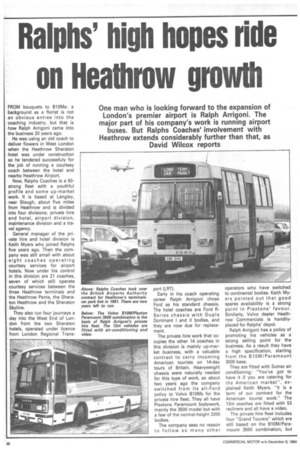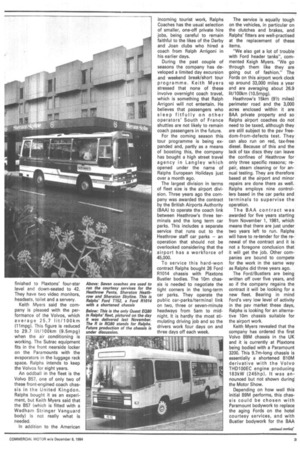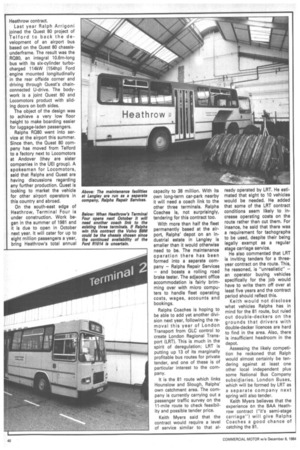Ralphs' high hopes ride on Heathrow growth
Page 40

Page 41

Page 42

If you've noticed an error in this article please click here to report it so we can fix it.
FROM bouquets to 810Ms: a background as a florist is not an obvious entree into the coaching industry, but that is how Ralph Arrigoni came into the business 20 years ago.
He was using an old coach to deliver flowers in West London when the Heathrow Sheraton hotel was under construction so he tendered successfuly for the job of running a courtesy coach between the hotel and nearby Heathrow Airport.
Now, Ralphs Coaches is a 50strong fleet with a youthful profile and some up-market work. It is based at Langley, near Slough, about five miles from Heathrow and is divided into four divisions; private hire and hotel, airport division, maintenance division and a travel agency.
General manager of the private hire and hotel division is Keith Myers who joined Ralphs five years ago. Then the company was still small with about eight coaches operating courtesy services for airport hotels. Now under his control in this division are 21 coaches, seven of which still operate courtesy services between the three Heathrow terminals and the Heathrow Penta, the Sheraton Heathrow and the Sheraton Skyline.
They also run four journeys a day into the West End of London from the two Sheraton hotels, operated under licence from London Regional Trans Early in his coach operating career Ralph Arrigoni chose Ford as his standard chassis. The hotel coaches are Ford RSeries chassis with Duple Dominant I and II bodies, and they are now due for replacement.
The private hire work that occupies the other 14 coaches in this division is mainly up-market business, with a valuable contract to carry incoming American tourists on 14-day tours of Britain. Heavyweight chassis were naturally needed for this type of work, so about two years ago the company switched from its all-Ford policy to Volvo B10Ms for the private hire fleet. They all have Plaxtons Paramount bodywork, mainly the 3500 model but with a few of the normal-height 3200 bodies.
The company sees no reason to follow so many other operators who have switched to continental bodies. Keith Myers pointed out that good spares availability is a strong point in Plaxtons' favour. Similarly, Volvo dealer Heathrow Commercials is handilyplaced for Ralphs' depot.
Ralph Arrigoni has a policy of promoting his vehicles as a strong selling point for the business. As a result they have a high specification, starting from the B10M/Paramount 3500 base.
They are fitted with Sutrac air conditioning: "You've got to have it if you are catering for the American market", explained Keith Myers. "It is a term of our contract for the American tourist work." The 12m coaches are fitted with 53 recliners and all have a video.
The private hire fleet includes four "Grand Tourers" which are still based on the B10M/Paramount 3500 combination, but finished to Plaxtons' four-star level and down-seated to 42. They have two video monitors, headsets, toilet and a servery.
Keith Myers said the company is pleased with the performance of the Volvos, which average 25.7 lit/1 0 Okm (11mpg). This figure is reduced to 29.7 lit/100km (9.5mpg) when the air conditioning is working. The Sutrac equipment fits in the front nearside locker on the Paramounts with the evaporators in the luggage rack space. Ralphs intends to keep the Volvos for eight years.
An oddball in the fleet is the Volvo B57, one of only two of these front-engined coach chassis in the United Kingdon. Ralphs bought it as an experiment, but Keith Myers said that the B57 (which is fitted with a Wadham Stringer Vanguard body) is not really what is needed.
In addition to the American incoming tourist work, Ralphs Coaches has the usual selection of smaller, one-off private hire jobs, being careful to remain faithful to the likes of the Darby and Joan clubs who hired a coach from Ralph Arrigoni in his earlier days.
During the past couple of seasons the company has developed a limited day excursion and weekend break/short tour programme. Keith Myers stressed that none of these involve overnight coach travel, which is something that Ralph Arrigoni will not entertain. He believes that passengers who sleep fitfully on other operators' South of France shuttles are not likely to remain coach passengers in the future.
For the coming season this tour programme is being expanded and, partly as a means of boosting this, the company has bought a high street travel agency in Langley which opened under the name of Ralphs European Holidays just over a month ago.
The largest division in terms of fleet size is the airport division. Three years ago the company was awarded the contract by the British Airports Authority (BAA) to operate the coach link between Heathrow's three terminals and the long term car parks. This includes a separate service that runs out to the Heathrow staff car parks — an operation that should not be overlooked considering that the airport has a workforce of 45,000.
To service this hard-won contract Ralphs bought 26 Ford R1014 chassis with Plaxtons Bustler bodies. The 10m chassis is needed to negotiate the tight corners in the long-term car parks. They operate the public car-parks/terminal link on two, three or seven-minute headways from 5am to midnight. It is hardly the most stimulating driving job and so the drivers work four days on and three days off each week. The service is equally tough on the vehicles, in particular on the clutches and brakes, and Ralphs' fitters are well-practised at the replacement of these items.
"We also get a lot of trouble with Ford header tanks", commented Keigh Myers. "We go through them like they are going out of fashion." The Fords on this airport work clock up around 33,000 miles a year and are averaging about 26.9 lit/100km (10.5mpg).
Heathrow's 15km (91/2 miles) perimeter road and the 3,000 acres enclosed within it are BAA private property and so Ralphs airport coaches do not need to be taxed, although they are still subject to the psv freedom-from-defects test. They can also run on red, tax-free diesel. Because of this and the lack of tax discs they can leave the confines of Heathrow for only three specific reasons; repair, steam cleaning or for an nual testing. They are therefore based at the airport and minor repairs are done there as well.
Ralphs employs nine controllers based in the car parks and terminals to supervise the operation.
The BAA contract was awarded for five years starting from November 1, 1981, which means that there are just under two years left to run. Ralphs will have to re-tender for the re newal of the contract and it is not a foregone conclusion that it will get the job. Other companies are bound to compete for the work in the same way as Ralphs did three years ago.
The Ford/Bustlers are being written off over five years, and so if the company regains the contract it will be looking for a new fleet. Bearing in mind Ford's very low level of activity in the pay market these days, Ralphs is looking for an alternative 10m chassis suitable for the airport work.
Keith Myers revealed that the company has ordered the first Volvo B9M chassis in the UK and it is currently at Plaxtons being bodied with a Paramount 3200. This 9.7m-long chassis is essentially a shortened B1OM derivative with the Volvo THD100EC engine producing 183kW (245hp). It was announced but not shown during the Motor Show.
Depending on how well this initial B9M performs, this chas sis could be chosen with Paramount bodywork to replace the aging Fords on the hotel courtesy services, and with Bustler bodywork for the BAA Heathrow contract.
Last year Ralph Arrigoni joined the Quest 80 project of Telford to back the development of an airport bus based on the Quest 80 chassisunderframe. The result was the RQ80, an integral 10.6m-long bus with its six-cylinder turbocharged 114kW (154hp) Ford engine mounted longitudinally in the rear offside corner and driving through Quest's chainconnected U-drive. The bodywork is a joint Quest 80 and Locomotors product with sliding doors on both sides.
The object of the design was to achieve a very low floor height to make boarding easier for luggage-laden passengers.
Ralphs RQ80 went into service at the airport this summer. Since then, the Quest 80 company has moved from Telford to a factory next to Locomotors at Andover (they are sister companies in the UEI group). A spokesman for Locomotors, said that Ralphs and Quest are having discussions regarding any further production. Quest is looking to market the vehicle for other airport operators in this country and abroad.
On the south-east edge of Heathrow, Terminal Four is under construction. Work began in the summer of 1981 and it is due to open in October next year. It will cater for up to eight million passengers a year, bring Heathrow's total annual capacity to 38 million. With its own long-term car-park nearby it will need a coach link to the other three terminals. Ralphs Coaches is, not surprisingly, tendering for this contract too.
With more than half the fleet permanently based at the airport, Ralphs' depot on an industrial estate in Langley is smaller than it would otherwise need to be. The maintenance operation there has been formed into a separate company — Ralphs Repair Services — and boasts a rolling road brake tester. The adjacent office accommodation is fairly brimming over with micro computers to handle fleet operating costs, wages, accounts and bookings.
Ralphs Coaches is hoping to be able to add yet another division next year, following the removal this year of London Transport from GLC control to create London Regional Transport (LRT). This is much in the spirit of deregulation; LRT is putting up 13 of its marginally profitable bus routes for private tender, and one of these is of particular interest to the company.
It is the 81 route which links Hounslow and Slough, Ralphs' own catchment area. The company is currently carrying out a passenger traffic survey on the 11-mile route to check feasibility and possible tender price.
Keith Myers said that the contract would require a level of service similar to that al ready operated by LRT. He estimated that eight to 10 vehicles would be needed. He added that some of the LRT contract conditions seem likely to increase operating costs on the route rather than cut them. For insance, he said that there was a requirement for tachographs to be used, despite their being legally exempt as a regular stage carriage service.
He also commented that LRT is inviting tenders for a threeyear contract on the route. This, he reasoned, is "unrealistic" — an operator buying vehicles specifically for the job would have to write them off over at least five years and the contract period should reflect this.
Keith would not disclose what vehicles Ralphs has in mind for the 81 route, but ruled out double-deckers on the grounds that drivers with double-decker licences are hard to find in the area. Also, there is insufficient headroom in the depot.
Assessing the likely competition he reckoned that Ralph would almost certainly be tendering against at least one other local independent plus some National Bus Company subsidiaries. London Buses, which will be formed by LRT as a separate company next spring will also tender.
Keith Myers believes that the experience on the BAA Heathrow contract ("it's semi-stage carriage") will give Ralphs Coaches a good chance of catching the 81.




























































































